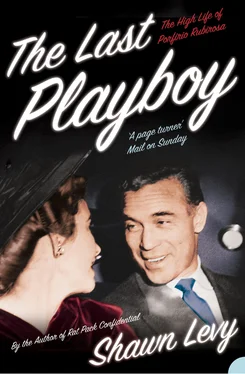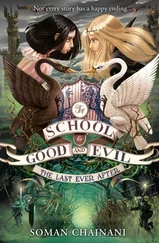It would be hard to imagine a worse fall: from golden aide-de-camp to anointed heir to broke, disgraced nonperson in less than three years. With whatever money they could scrounge, Porfirio and Flor decided to leave the country and look for less dreary prospects in the United States. In the winter of 1934–35, they moved to New York City. Trujillo, perhaps to let them tumble further into his debt, let them go.
This was, in most ways, madness. In Ciudad Trujillo, even on the outs with the Benefactor, they had connections, prestige, resources. In New York, for which they didn’t even have the proper winter clothing, they were broke, they didn’t speak the language, and they were anonymous refugees living in a cheap Broadway hotel and, later, in Greenwich Village, where at least one associate would later remember Porfirio working, briefly, as a waiter.
“It was a nightmare,” Flor remembered. Her husband, as he had back home, “disappeared to play poker with Cuban gangster types while I waited in that dingy hotel room, watching the Broadway signs blink on and off.”
There was no money: “When he won, we ate; when he lost, we starved.”
And he had other interests: “He would come home at 6 a.m., his pockets stuffed with matchbooks scribbled with the phone numbers of women.”
They fought: “Angry, brutal, he shoved and hit me when we argued.”
It was utterly foolish to think of New York as a going prospect. They could count on no help from the consulate, which obviously answered to her father. There was a Dominican presence in the Latin American community in the north of Manhattan, but most of that contingent was made up of people who had fled Trujillo and were actively plotting his replacement—again, a dead end. The only significant contact they had was a mixture of comedy and menace: three cousins of Porfirio’s, sons of Don Pedro’s sister, who had been raised in the city since boyhood and had spent most of their grown years engaged in petty crime and worse. “When I saw ‘West Side Story’ I was reminded of them,” Flor recalled. “Good-for-nothings who had never worked.”
Among them was Luis de la Fuente Rubirosa, aka Chichi, who had been in trouble with the law since boyhood. In 1925, he had been arrested for burglary and sentenced to a spell at the New York Reformatory for Boys. In 1932, he was tried for assault and robbery and acquitted. He was short, maybe five-foot-six, with jug ears and a pinched face and sharp cheekbones, a wiry, dangerous little creep, plain and simple, with nothing to offer his cousin and his wife in the way of truly promising possibilities.
New York was coming to seem even more disastrous than Ciudad Trujillo. And then the most unexpected lifeline appeared: a telegram from the Benefactor announcing that Porfirio had been elected— elected! —to the national congress and that both he and Flor were required back home. Unable to explain what was happening, they were equally unable to resist.
Trujillo’s congress was a dog-and-pony show that fooled no one. The deputies were required upon taking office to submit signed and undated letters of resignation so that the president could remove them at any time for any cause; it wasn’t unusual for a man to return from lunch to attend the afternoon session only to find out that he had, without knowing it, quit his post during the recess. And when they did sit, the legislators were utterly impotent. “In every session,” Porfirio remembered, “the President read aloud a proposed law and we adopted it with a show of hands. There was never any question of discussing it.”
A nation conditioned by centuries of rebellion and despotism wasn’t especially outraged by this pantomime of a government. And Trujillo was modernizing the Dominican Republic in a way that no previous tyrant had: paying off its staggering national debt to the United States, paving roads, building an electrical grid, and so forth. Soon after he took power, the island suffered a devastating hurricane that virtually bowled it back to the Stone Age; the speed of repairs and, indeed, improvements under Trujillo’s firm hand made him a hero in the eyes of his countrymen.
As a result, Trujillo had no shortage of stooges who could fill the seats of this cardboard congress, so it wasn’t at all clear to Porfirio why he was so urgently needed. But in April 1935, he was called in to see the president—who suddenly seemed very happy to see his son-in-law—and given a delicate assignment. When he got home, he told Flor that he would be going back to New York the next day on official business.
On April 16, Porfirio disembarked from the S.S. Camao in New York and checked into the St. Moritz Hotel on Central Park South. Along with his personal effects, he had a suitcase containing $7,000 in cash. *A few days later, he toted that suitcase to the Dominican consulate on Fifth Avenue, where he met with a small group that included his cousin Chichi. On April 27, he left for Miami; from there he sailed for San Pedro de Macorís, his spare suitcase filled this time with new dresses and other gifts for Flor.
The following day, a Sunday, a group of Dominican dissidents met in Manhattan to discuss their plans for unseating Trujillo. Among them was Dr. Angel Morales, the most recognized Dominican statesman in the world. In the years before Trujillo’s assumption of power, Morales had served his country as minister of the interior, minister of foreign affairs, minister to Italy, minister to France (he was once Don Pedro Rubirosa’s boss), and minister to the United States. In the mid-1920s, he had been elected vice president of the League of Nations. In 1930, he had run in the rigged election that gave Trujillo the presidency; when he lost, he fled to New York for his life and was declared a traitor; all his property in the Dominican Republic was confiscated by the new government.
As an alternative to Trujillo, Morales had supporters not only in the Dominican exile community but in the U.S. government and among private parties in North America who sought to foster change in the island nation. But he so feared Trujillo’s ruthlessness and reach that he lived in New York like a hunted man. He shared a Manhattan rooming house flat with Sergio Bencosme, a general’s son who had served Trujillo’s rivals as a congressional deputy and minister of defense. The two lived on the proceeds from a small coffee importing business. And they tiptoed around the city in mortal trepidation: Morales was said to be hesitant to eat anywhere save at his landlady’s table for fear of being poisoned or attacked.
His fears were justified that Sunday night. When the dissident meeting broke up, Morales, in a rare feeling of well-being, went to dine out with friends. Bencosme returned to their apartment on the seventh floor of a Washington Heights walk-up and a supper cooked by Mrs. Carmen Higgs, their thirty-year-old Latina landlady.
At about 8 P.M., there was a knock at the door. Mrs. Higgs, who shared her lodgers’ fears, asked who was there.
“Open this door,” came the harsh reply.
She cracked the door to have a look, and a short, wiry man in a brown suit and brown hat pushed in past her, brandishing a .45 caliber pistol. Mrs. Higgs screamed and leapt back into the kitchen; fearing a robbery, she removed her engagement ring and wedding band and tossed them into a coffeepot that was percolating on the stove. The gunman looked into the kitchen and then moved down the hall, first into the living room and then into an adjoining bedroom.
Bencosme, shaving for dinner, his face covered in lather, heard the commotion, came toward the front door, and peered into the living room. Finding it empty, he went on to the kitchen to see what the screaming was about. From the rear of the apartment came a shout—“Die, Morales!”—and two shots struck Bencosme in the back; the bullets passed through his body and lodged in a bureau. The gunman ran through the hall—over the body and past Mrs. Higgs—and down the six flights of stairs into the street. Bencosme, staggering and in agony, made his way to the apartment of a neighbor who had a telephone and rang for help.
Читать дальше












